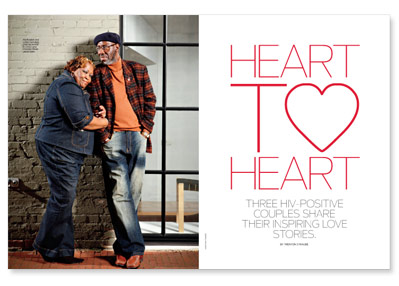
Living with HIV doesn’t mean you have to live without love and romance. Plenty of positive people have met, and married, their soul mates. How do these couples make it work? What role does the virus play in their relationships and health? And what advice can they offer lovelorn singles and struggling couples? Three long-term couples—in which both partners are HIV positive—get to the heart of the matter.
Nathaniel & Linda Scruggs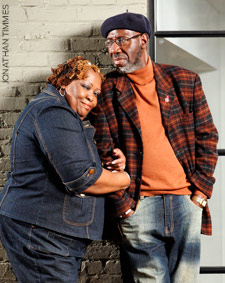 Their Love Story
Their Love Story
An email introduction in 2002 sparked a conversation between Nathaniel and Linda Scruggs that led to marriage three years later. A mutual friend “saw us both enjoying life and brought us together,” Linda recalls, adding that at the time “I was very much not looking to date.” But the two got to know each other via those phone and email conversations before they even began dating. “He was able to have an intellectual conversation, to give me brain teasers. We had conversations about embracing life.” He really impressed her, though, when he invited her to hear him talk at a drug recovery meeting marking 12 years of clean living. “When he stood up for this group,” she recalls, “I was in awe. He was just telling his truth, and he was just real OK with it.”
For both of them, there was a lot of truth to tell. Nathaniel had been a drug addict and a womanizer; Linda had also abused drugs and alcohol, and she’s a survivor of rape and incest; and both have adult children from previous relationships. Importantly, both had faced these issues and worked on their own mental, spiritual and physical needs before they met. “It was all just practice for this union,” Linda says, adding that “our church and faith are the ultimate center of our strength.”
When they finally hooked up face-to-face and began dating, what drew them to each other? “Linda presented a femininity with ladylike flair,” Nathaniel says. “I liked that. Skirts, stockings, hair done. Perfume. That was part of it.” He also liked her attitude. When she spoke of her past, he says, “she spoke not as ‘I’m a victim,’ but as ‘I’m overcoming it.’” And Linda, who often holds positions of leadership on the job, enjoys leaving those responsibilities at the office. “It’s attractive to come home to someone who is the head of the household,” she says, and her husband plays that role well—with a healthy give and take: “Linda likes to cuddle,” he says, “so I’ve learned to conform to cuddling more.”
“We have learned to fulfill ourselves individually,” Linda adds, “therefore we’re able to come together and find balance. When I want to give of me more and more, it’s Nate, my general, who says, ‘Linda, stop, you can’t do it all.’ And it’s me who will book a vacation or say to him, ‘Just relax and laugh.’ We bring balance to each other’s complex lives.”
In Sickness & In Health
Nathaniel, 60, found out he had HIV in 1996, when he was hospitalized with what turned out to be ulcers and a slew of opportunistic infections. That’s when many of his friends confided in him that they, too, were positive. “When I asked them, ‘What are you doing about it?’ very few could give me an answer, because they were so messed up about stigma [and refused to get help],” Nathaniel says. He took the opposite track. He got educated, he found support, and he didn’t keep his status a secret. It paid off, not only health-wise, but also career-wise. Today, he’s a case manager and counselor for Total Health Care Inc. in Baltimore (he commutes from his and Linda’s home in Forestville, Maryland, a suburb of Washington, DC).
Linda, 47, learned of her status when she was 25, during a routine pregnancy checkup. Her journey also led to HIV advocacy. She’s currently working with AIDS United and the Altarum Institute, and she is co-owner of Ribbon Consulting Group, which helps build community leadership and organizational wellness. But for a long time, she refused to date positive guys because all the heterosexual positive men she met viewed the virus as a death sentence. “And if you think you’re going to die,” she says, “then you’re going to die. And I was going to fight.” When she began dating Nathaniel, she was deciding whether to stick with antiretroviral treatment, something she had been delaying. Then visiting his house, and seeing the supplements and how treatment helped him, she decided to make the commitment. (The best way to teach, Nathaniel says, is through example.) All this time, she realized, she had been worried that an HIV-positive lover might die before her, but she was jeopardizing her own life by not taking care of her total health.
Happily Ever After Advice
Friends and family ask them for relationship advice. “We do talk to them about HIV,” Linda says, “and about communication. Nate asks them, ‘Why do you want a relationship? What are you bringing to the relationship?’” She points out that disclosure is an issue if you’re HIV positive, and that if you wait to disclose until after you are emotionally attached, then you’ll be more hurt if the potential love interest has problems with your status. You can feel out the issue, she says, without disclosing. For example, talk about an HIV article you read. If your date responds negatively, then the relationship may be trouble. Nathaniel notes another common issue: “People often don’t have enough self-worth. They let HIV dominate their existence. That’s a damaging thing.”
What’s their secret to making their marriage work? “We don’t have secrets,” Nathaniel says. “What we have is a level of openness and commitment to continue to be the best person we can be outside the relationship so that the relationship can flourish.” It also helps, he says, that “we play a lot, laugh a lot and share our days and nights.” And Linda advises couples to “go on vacation—even if it’s to a hotel in your own town. See the beautiful city you live in. You don’t have to have a lot of money. Just find simple things to do.”
Mark de Solla Price & Vinny S. Allegrini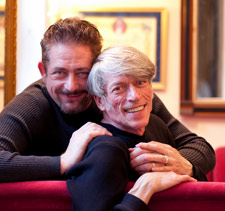 Their Love Story
Their Love Story
The business cards they hand out say it all: “MarkandVinny.com,” as if they’re a unified entity, like Ben & Jerry’s. Mark de Solla Price and Vinny S. Allegrini met June 16, 1993, at an HIV support group in Manhattan’s Greenwich Village led by Marianne Williamson and based on A Course in Miracles. “She said, ‘Turn to the person in the row behind you. Put your right hand on their heart and their right hand on your heart and repeat after me,’” Mark recalls of being paired off with Vinny for the prayer exercise. “There we were looking into each other’s eyes. It was really kind of wonderful.”
After the session, Mark stayed to get a promotional blurb from Williamson for the book he was writing, Living Positively in a World With HIV/AIDS, and when he walked outside, Vinny was waiting for him. The two went to Café Rafaella and talked for hours, mostly about treatment strategies (Mark links his diagnosis to 1983, Vinny to 1989). “We really hit it off, and I invited Vinny to my house—where we had the worst sex ever.” “Why do you have to mention that?” Vinny cuts in, his voice weary, not so much from the end stage liver disease he’s battling today, but more from hearing this revealing detail for the millionth time. Then he concedes: “It was awful. But I wanted a second date because Mark was very smart and very kind.” Maybe they were out of sync that first night—Vinny was looking for a friend, and Mark for a relationship—but that soon changed.
Mark, who was a technology consultant in Manhattan, and Vinny, a Vidal Sassoon hair cutter in West Hartford, Connecticut, got married in September 1995 (the progressive rabbi who officiated lost his synagogue as a result of the publicity). But it wasn’t happily ever after. Hepatitis B, cirrhosis, AIDS and dementia beset Vinny. In 2001, expected to die, he was placed in home hospice care. At this low point, he said to Mark, “You never signed up for this when you married me.” That spurred them, in 2003, to have the hospice chaplain renew their vows (which they originally wrote in Central Park’s Strawberry Fields). Then, inexplicably, Vinny got better, and in 2005, they were lawfully married in Massachusetts, where same-sex marriages were now legal.
Today, they’re both retired and on disability. Mark, 52, still writes, and he is “a secular humanist chaplain active as a Unitarian Universalist and a Zen Buddhist—and I’m a devout atheist.” And Vinny, 64, cuts hair at home for therapeutic reasons. They live in a Greenwich Village apartment they share with Troika, a Hurricane Katrina rescue dog. If you see Mark and Vinny along the Hudson River, walking Troika, say hi! They’re sure to give you one of their business cards.
In Sickness & In Health
Both Mark and Vinny have been diagnosed with AIDS and hepatitis (Mark was successfully treated for hep C in 2007). “One of the great things about HIV,” Mark says, “is that you come to terms with the fact that life is a terminal condition and you might not have tomorrow—and that’s a healthy way to look at life.” At various times, each has played the role of caregiver. And sometimes, they work together. Each month, they “pour their pills,” a ritual of organizing their regimen of pills and powders for the upcoming month—for HIV, liver disease, diabetes, triglycerides and more. “The end result,” Mark says, “is that we take 20,454 pills a year”—Mark alone takes 37 a day. “But,” Vinny adds, “our compliance is spectacular,” which he attributes to Mark’s organization. They also attend all their doctor’s appointments together. “In the beginning, Vinny was freaked out and needed a second pair of ears and someone to take notes,” Mark says, “and when I was zoned out on [hep C] treatment, I needed a second pair of ears.”
Happily Ever After Advice
“Relationships aren’t easy,” say Mark, who, as a chaplain, has counseled other couples. Relationships require honesty, communication, a profound commitment to the relationship, but also a solid and mutual understanding of what you’re committing to. “People tease me that our [wedding] vows include home decoration but not monogamy,” Mark says. “There was a time when sex was a bigger issue—now, it’s not important, we just want to cuddle—but the key is, you write the vows, you live the vows. It depends on what you commit to. You’d be surprised at how things like monogamy and community property [such as shared bank accounts] are assumed to be part of the deal.” It’s also important to make an effort each day for intimate, loving moments. For example, Mark explains, they both deal with chronic pain, and “it’s really easy to be grumpy when it just hurts,” so they do simple things for each other, like giving foot massages, walking the dog together and expressing their emotions. “We both really love one another and support one another,” Vinny says. “In bed, I look over to him and say, ‘Mark, you’re beautiful.’ He doesn’t feel it, but he is.”
Scott & Cindy Daly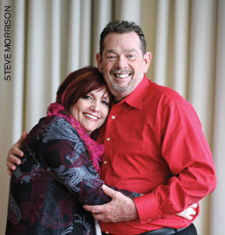 Their Love Story
Their Love Story
If you’re lucky, your future soul mate will drive right up to you and introduce himself. That’s what happened to Cindy Daly in 1992. She had just been diagnosed with HIV a few weeks earlier and moved back in with her dad in Schenectady, New York. A female positive friend invited her to an HIV support group at a Unitarian church, and fellow group member Scott Daly had agreed to pick them up.
The two had never met, “but when she walked out of the apartment,” Scott recalls, “I guess you could say it was love at first sight.” The two hit it off, even flirting that first night. “I loved her beauty, her energy, and most important, that she was HIV positive,” says Scott, who had tried dating HIV-negative women—he tested positive in 1986—but the fear of passing along the virus weighed too much on him. “Being newly diagnosed,” Cindy recalls of their first encounter, “I thought I would be dead in two to three years. Yet here was this healthy, open individual who was working and living a productive life after six years [of being positive]. I wanted to know more!” She was also drawn to his “compassion and total honesty—he tells everything he’s thinking and feeling,” and the two started dating. They married two years later—at the church where they attended support meetings. (Both had been previously married and divorced, and both contracted HIV from a person they dated after the first marriage.)
Like any couple, they faced challenges. Those posed by HIV, however, were “mostly perceived challenges, not real ones,” Cindy says, “but we made choices based on those perceptions.” Because they believed they might die soon, they elected not to have children, who would be orphaned, or to buy a house, which would saddle the surviving partner with a mortgage. “I never thought long-term about changing my career—I was just happy we could support ourselves,” says Cindy, who got a job at the insurance company where Scott has worked nearly 40 years. Time passed, then as the 20th anniversary of her diagnosis approached, she had an epiphany: “I could be alive another 20 years, so I wanted [a career] I really liked.” With Scott’s full support, in 2011 at the age of 51 she enrolled in a Paul Mitchell school and became a hairdresser. And with Cindy’s support, Scott is transitioning from insurance into advocacy work for AIDS and Lou Gehrig’s disease.
Turns out that HIV didn’t derail their other dreams. Today, they own a house, and they have an extended, close-knit family including grandchildren (via Scott’s son from his first marriage). But the real and perceived limitations of having HIV still linger—especially with health insurance benefits in flux and with retirement on the horizon. “I can’t imagine us living past 80,” Cindy says. “But then again, my dad lived to be 80, and he had five heart attacks. As crazy as it seems, I could live into my 80s.”
In Sickness & In Health
“We lost a lot of dear friends from that ’90s support group”—of about 30 people, five are left; the others are memorialized in an AIDS Quilt panel—“and we’ve had our share of opportunistic infections,” Scott says, “but if you dwell on those illnesses instead of doing what you need to get well, then you’ll only make yourself sicker.” Cindy agrees, adding that “if you take care of things early, then they’re smaller and they don’t become so difficult to deal with.” She credits Scott for her healthier habits. “I’m terrible at taking meds. He pushed me. I’m much better about making and keeping appointments. He helped me learn to do that too.”
But health isn’t just about CD4 counts and pill regimens. Scott candidly talks about another arena the virus infiltrates: the bedroom. “The euphoria of having sex with a positive woman for the first time—because I was no longer concerned about infecting her—really brought the sensuality back into the sex,” he says of their earlier encounters. “But when I started protease inhibitors, one of the first things I noticed was a diminished sex drive. Then Cindy had to deal with female issues. So a big challenge has been a loss of our sex life.” The two have gone to couples therapy to work through the issue. They both realize it’s a challenge for many couples, positive and negative, but Scott wonders what role HIV plays. “Nobody ever talks about it,” he notes. “Why aren’t we talking about that?”
Happily Ever After Advice
“I don’t think my advice would be different for someone positive or negative,” Cindy says. “Honesty is the most important thing you can bring to the table. And tolerance, and letting people grow at their own pace.” And learning how to argue. “If you’re agitated,” she says, “walk away and don’t come back to the subject until you’ve calmed down and can hear each other’s point of view.” Scott says it’s important for couples to support each other in doing things they’re passionate about. Also, “toss aside the petty stuff and concentrate on what’s important. When you are given a life sentence, you make sure to make every day count.”





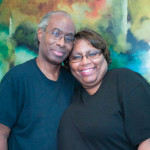

10 Comments
10 Comments